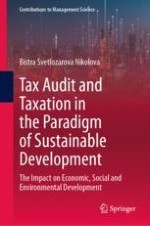This book discusses how taxation can contribute to a sustainable economic development. It analyses the role and functions of taxes and tax audits with special focus on sustainable development, considering not only the fiscal functions of taxes but also their economic, social, and environmental effects. The book sheds light on the impact of corporate social responsibility (CSR) on taxation and discusses principles of good governance in tax administration. The author also analyses the preconditions and indicators for cross-border tax fraud and the possibilities for counteraction. Furthermore, the book examines tax reliefs and rates, and how the different types of taxation – flat, progressive, and regressive taxes, can impact economic, social, and environmental development. In the last section, the author discusses how to achieve economic, social, and environmental effects through taxation. This book will appeal not only to academics working in this field, but also to practitioners who would like in-depth insights into these topics.
